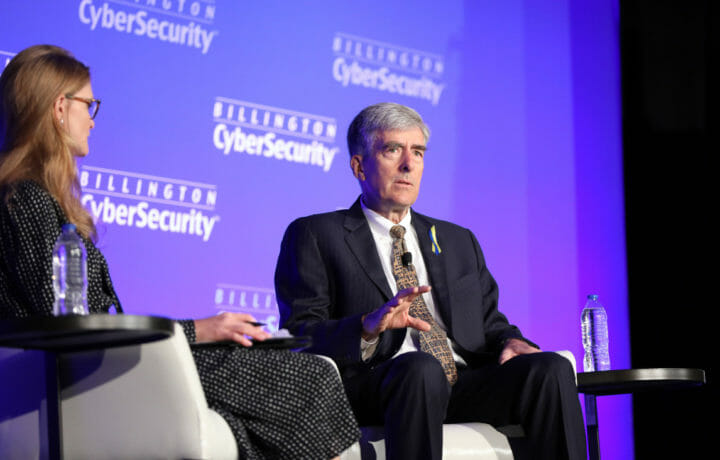In a fireside chat at the 13th Annual Billington Cybersecurity Summit, White House Cyber Director, the Honorable Chris Inglis shared key developments, initiatives, and concerns with the audience. Moderator Jordana Siegel, Cybersecurity and Data Protection Public Policy at Amazon Web Services (AWS) commented that all the happenings, like SolarWinds and data breaches have made the past year feel like a massive cyber sprint.
Inglis agreed, saying that thought leadership has advanced considerably after passing the tests thrown at everyone in cybersecurity this past year. It really has rallied everyone on the importance of cybersecurity, but Inglis noted that we still have a long distance to go. Inglis shared that, “like climate change, we can’t turn things around overnight.”
Despite the urgency for cybersecurity rising, priorities remain the same, according to Inglis. So, he said that we need to double down on resilience by design -in technology – and roles and responsibilities of the people too. He emphasized that we can’t have a division of effort. We need to make it so that everyone is locking arms together as one team, working on a common cause.
Collaboration is the Key to Success in Cybersecurity
In cyberspace, division of effort is overtaken by the need for collaboration, sharing thoughts, and everyone leaning in. Inglis says this is the new way forward. It’s easier to divide efforts, but that leaves us vulnerable. The federal government has long struggled to lessen their stove piped approach. Cyber threats tend to break down barriers and force people to work together.
Inglis pointed out that our adversaries will learn that the U.S. is a team that works together, making it more difficult to target. While we have some inefficiencies, Inglis noted that once we have the cyber expertise built, we need to deploy it together in order for it to work. Inglis called out the games that have long been played in federal government, with different power struggles. He noted that the games are done, and we’re working together with a common goal.
But getting the right infrastructure in place is a key leadership initiative. Inglis noted that while it’s relatively easy to collaborate during a crisis, when the dust settles, the everydayness of cybersecurity is our defense against U.S. adversaries.
Cyber Talent Needed
It’s true that there’s a cyber talent shortage -for both federal government and contractors. And while the federal government is focused on building cyber talent, Inglis noted that there are bigger people issues than just finding the right talent. He said that the end goal isn’t just to fill the open billets, but we need to build the right knowledge and abilities. He cautioned against searching for talent without bothering to provide the right education and training to current cyber talent. Building strong teams requires a diverse talent approach.
And Inglis pointed out that it’s important for all of use to train the next generation. He said, “We need to teach kids about cyberspace – not just how to avoid a hot stove.” To that end, it’s about offering internships, apprenticeships, and other learning opportunities that will help the U.S. get cybersecurity right in the future.
What keeps you up at night?
Other than thinking about the Georgetown basketball team’s score, Inglis said he sleeps well. However, when it comes to cybersecurity concerns or goals, Inglis identified a key issue in keeping the U.S. safe. He noted that the federal government and U.S. companies all need to do their part in ensuring that our digital infrastructure remains secure. We all depend on it. He likened it to all the safety precautions we take in driving – looking both ways before crossing and being aware of transportation safety laws. He noted that everyone needs to be serious about the country’s cyber aspirations and goals. We need everyone on the same page, staying vigilant. It’s not okay to assume that your cybersecurity team will worry about every threat or risk. Mitigating risks and protecting the U.S. against cyber threats is a team effort. Inglis said, “We need everyone in and participating.”




